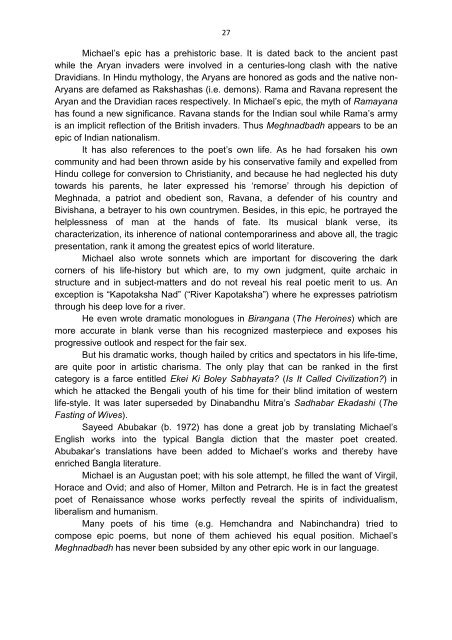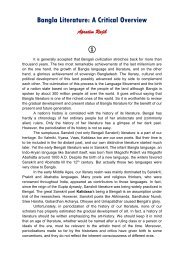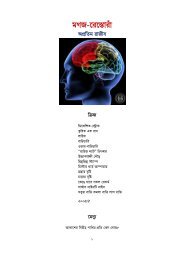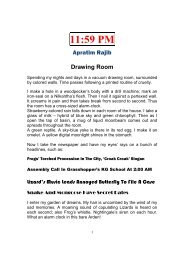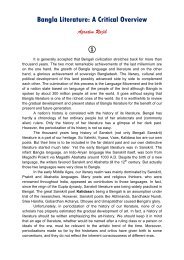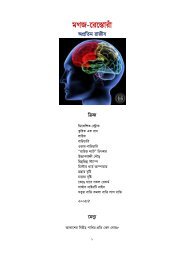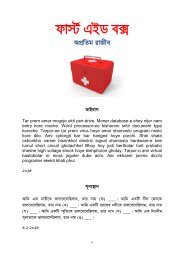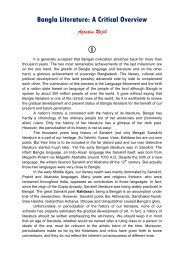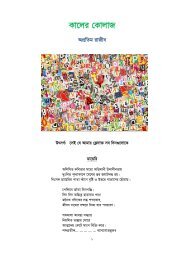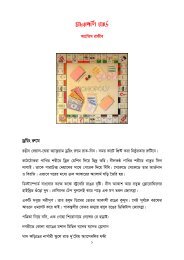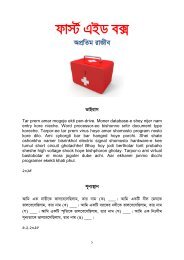BLiterature-Apratim
Create successful ePaper yourself
Turn your PDF publications into a flip-book with our unique Google optimized e-Paper software.
27<br />
Michael’s epic has a prehistoric base. It is dated back to the ancient past<br />
while the Aryan invaders were involved in a centuries-long clash with the native<br />
Dravidians. In Hindu mythology, the Aryans are honored as gods and the native non-<br />
Aryans are defamed as Rakshashas (i.e. demons). Rama and Ravana represent the<br />
Aryan and the Dravidian races respectively. In Michael’s epic, the myth of Ramayana<br />
has found a new significance. Ravana stands for the Indian soul while Rama’s army<br />
is an implicit reflection of the British invaders. Thus Meghnadbadh appears to be an<br />
epic of Indian nationalism.<br />
It has also references to the poet’s own life. As he had forsaken his own<br />
community and had been thrown aside by his conservative family and expelled from<br />
Hindu college for conversion to Christianity, and because he had neglected his duty<br />
towards his parents, he later expressed his ‘remorse’ through his depiction of<br />
Meghnada, a patriot and obedient son, Ravana, a defender of his country and<br />
Bivishana, a betrayer to his own countrymen. Besides, in this epic, he portrayed the<br />
helplessness of man at the hands of fate. Its musical blank verse, its<br />
characterization, its inherence of national contemporariness and above all, the tragic<br />
presentation, rank it among the greatest epics of world literature.<br />
Michael also wrote sonnets which are important for discovering the dark<br />
corners of his life-history but which are, to my own judgment, quite archaic in<br />
structure and in subject-matters and do not reveal his real poetic merit to us. An<br />
exception is “Kapotaksha Nad” (“River Kapotaksha”) where he expresses patriotism<br />
through his deep love for a river.<br />
He even wrote dramatic monologues in Birangana (The Heroines) which are<br />
more accurate in blank verse than his recognized masterpiece and exposes his<br />
progressive outlook and respect for the fair sex.<br />
But his dramatic works, though hailed by critics and spectators in his life-time,<br />
are quite poor in artistic charisma. The only play that can be ranked in the first<br />
category is a farce entitled Ekei Ki Boley Sabhayata? (Is It Called Civilization?) in<br />
which he attacked the Bengali youth of his time for their blind imitation of western<br />
life-style. It was later superseded by Dinabandhu Mitra’s Sadhabar Ekadashi (The<br />
Fasting of Wives).<br />
Sayeed Abubakar (b. 1972) has done a great job by translating Michael’s<br />
English works into the typical Bangla diction that the master poet created.<br />
Abubakar’s translations have been added to Michael’s works and thereby have<br />
enriched Bangla literature.<br />
Michael is an Augustan poet; with his sole attempt, he filled the want of Virgil,<br />
Horace and Ovid; and also of Homer, Milton and Petrarch. He is in fact the greatest<br />
poet of Renaissance whose works perfectly reveal the spirits of individualism,<br />
liberalism and humanism.<br />
Many poets of his time (e.g. Hemchandra and Nabinchandra) tried to<br />
compose epic poems, but none of them achieved his equal position. Michael’s<br />
Meghnadbadh has never been subsided by any other epic work in our language.


